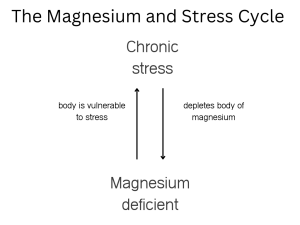Magnesium – nature’s own chill pill.
Magnesium is a relaxant aid that helps you wind down and – relax! This article contains everything you need to know about magnesium and its effects on stress. We cover what magnesium is, the vicious magnesium-stress cycle, and magnesium supplementation benefits.
What is magnesium?
Magnesium is a widely abundant essential mineral. It regulates many processes in our body, including muscle control, mood, glucose metabolism, DNA repair and energy, bone and protein production. But importantly, magnesium is the brake for our nervous system – pulling it back before it goes into overdrive. Interestingly, signs of magnesium deficiency are similar to symptoms of stress. For example, common symptoms include fatigue, irritability, mild anxiety, and gastrointestinal spasms (or an upset stomach).
Risk factors for magnesium deficiency include:
- Diets high in sodium, calcium and protein.
- Pregnant or menopausal women.
- Excessive caffeine or alcohol intake.
- Health conditions that cause the bowels and kidneys to release too much magnesium.
As we cannot produce magnesium ourselves, we must get it from our diet. How much magnesium should we have each day? New Zealand’s Recommended Daily Intake (RDI) for magnesium is 420mg for men and 320mg for women.
Foods highest in magnesium are:
- Chia seeds – 30g contains 111mg
- Pumpkin seeds – 30g contains 156mg
- Almonds – 30g contains 80mg
- Soymilk – 1 cup contains 61mg
- Peanuts – 1/4 cup contains 63mg
- Spinach – 1/2 cup boiled contains 78mg
- Avocado – 1 cup contains 44mg
- Wholegrain bread – 2 slices of bread contains 44mg
Pro You Protein Blends contain 20% of your magnesium RDI for an easy, convenient nutritional boost.
Magnesium and Stress

The Magnesium and Stress Cycle suggests chronic stress drains your body of magnesium, and low magnesium levels enhance vulnerability to stress (1). This creates a vicious cycle where a stressed person has depleted magnesium levels, further impairing their ability to manage stress. A high magnesium diet or supplement can help break the cycle by boosting magnesium levels.
Magnesium supplements alleviate stress symptoms, including fatigue, irritability and poor sleep (2). They can also help support muscles in recovery and relaxation.
Magnesium supplements may accomplish this by lowering cortisol levels and improving our stress response.
Benefits of Magnesium Supplementation:
- Supports better sleep
- Improves fatigue
- Stabilise and improve mood
- Supports muscle recovery and relaxation
- Supports energy production
Lastly, managing stress is a complex issue that requires a holistic, personalised approach incorporating diet, sleep, exercise and supplementation. If your mental health is struggling, there is no one solution or fix-all. Reach out for help if you need to, and talk to a professional.
This information is for educational purposes only and is in no way medical advice. If you are concerned about your health, please talk to your local GP or health professional.
1. Pickering G, Mazur A, Trousselard M, et al. Magnesium Status and Stress: The Vicious Circle Concept Revisited. Nutrients. 2020;12(12):3672. Published 2020 Nov 28. doi:10.3390/nu12123672
2. Akarachkova E. The role of magnesium deficiency in the formation of clinical manifestation of stress in women. Probl. Women Health. 2013;8:57







